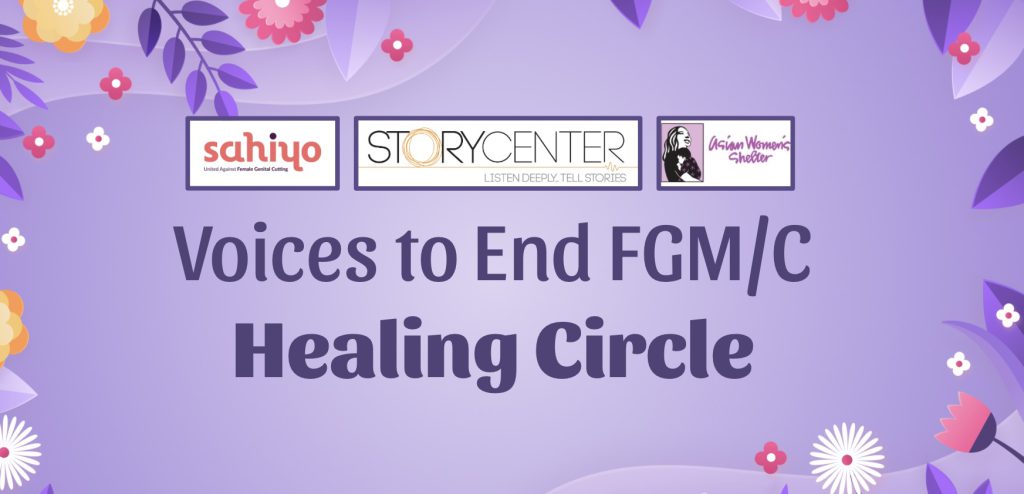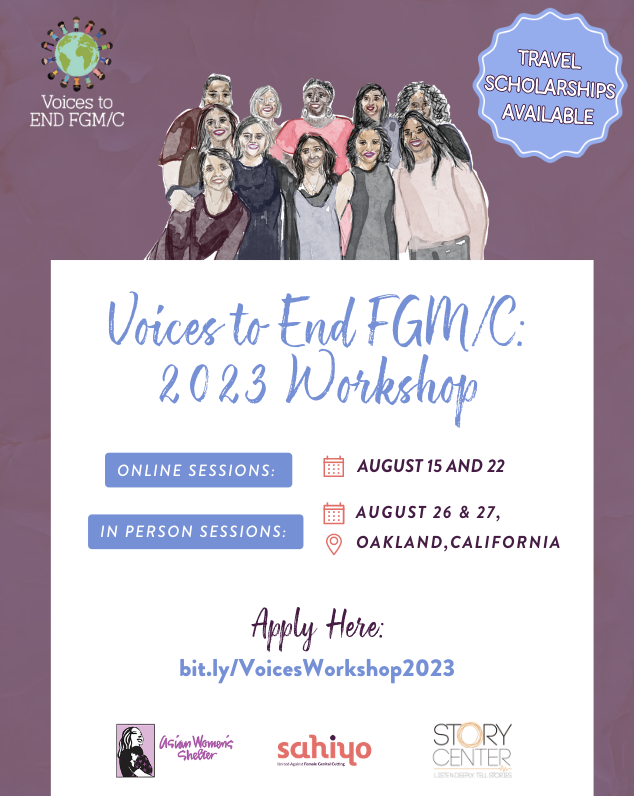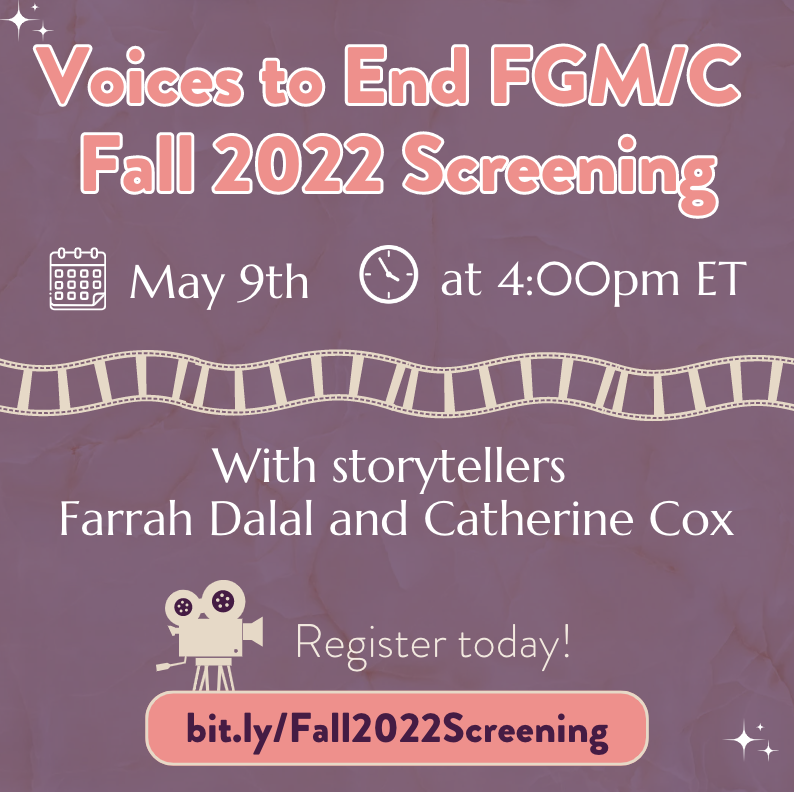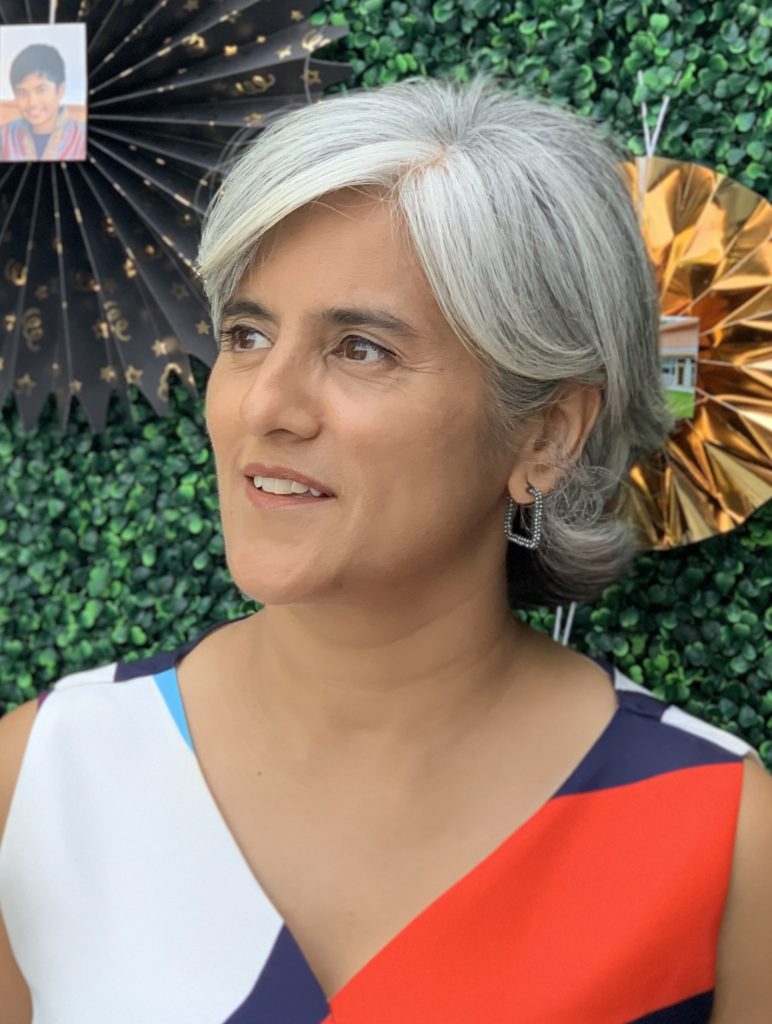Sahiyo holds first Voices to End FGM/C Healing Circle

On March 13th, Sahiyo held our first Voices to End FGM/C Healing Circle in partnership with StoryCenter and Asian Women’s Shelter. As the Voices to End FGM/C project has grown over the past 5 years with over 60 participants, storytellers have asked to be able to connect in other ways. After receiving feedback via a survey on what additional support structures would be helpful for our program participants, we initiated the Voices to End FGM/C Healing Circles. These Healing Circles continue to provide a safe space for our past project participants to hold conversations with one another on FGM/C; to reflect on their journey in sharing their story; and continue to strengthen their support systems in place by building community with Voices participants from other cohorts.
Sahiyo Announces it’s 8th Voices to End FGM/C Digital Storytelling Workshop

Sahiyo is happy to announce we’re hosting our first hybrid-format Voices to End FGM/C Digital Storytelling Workshop this August 2023! During this workshop, each participant will learn to create their own video through the use of voiceover audio, still images, and video clips. This participatory media process will be guided by facilitators from Sahiyo, StoryCenter, and Asian Women’s Shelter. Online Workshop Dates: Tues, Aug 15th & Tue, Aug 22nd (via Zoom) In-person Workshop Dates: Sat, Aug 26th & Sun, Aug 27th In-person Workshop Location: Oakland, California. Who Can Apply: Individuals living in the U.S. who have experienced FGM/C, as well as family members, friends, advocates, and others living in the U.S. who would like to share a story about the impact of FGM/C in their lives. Application Link: https://bit.ly/VoicesWorkshop2023. Application Deadline: July 15th TRAVEL SCHOLARSHIPS ARE AVAILABLE for all who are accepted into the program and in need of financial support to attend the workshop! To learn more about the Voices workshop experience, watch our behind the scenes video.
Upcoming screening of the Fall 2022 Voices To End FGM/C digital stories

Our latest stories from the 7th Voices to End FGM/C Digital Storytelling Workshop have been released! Sahiyo, StoryCenter, and Asian Women’s Shelter will be hosting a screening of these newest videos next month on May 9th. Along with viewing these poignant stories, which detail the impacts FGM/C has had on our storytellers, attendees will get the chance to hear from the storytellers themselves.They will share their workshop experiences and reasons why they decided to tell the story they did, in support of education and advocacy initiatives to end FGM/C. Event Details: Date: Tuesday, May 9th, 2023Time: 4:00 to 5:30 pm ET / 1 to 2:30 pm PT Where: Virtual Zoom Webinar Registration: bit.ly/Fall2022VideoScreening
Sahiyo spotlight: Incoming U.S. Advisory Board Chair Zehra Patwa

Zehra Patwa, Sahiyo U.S. Advisory Board Chair, is the Co-Founder and U.S. Lead of WeSpeakOut, an organization that strives to work for equal rights for Bohra women in all spheres of life, specifically, on Female Genital Mutilation/Cutting (FGM/C) or khafz. She grew up in London and was educated at the University of Bradford Management Centre in the UK and the Université de Montpellier in France. She serves on several boards, including Integrated Refugee and Immigrant Services (IRIS), and currently serves as Vice-Chair of the Sahiyo US Advisory Board. After discovering well into adulthood, that khatna or khafz (type 1 FGM/C) was practiced in her community and that she, too, had been subjected to it, she decided she could no longer keep silent. Although she has no recollection of the practice being done to her, she is vehemently opposed to it and has been working with WeSpeakOut to expose the practice within, and outside, the community. Zehra is passionate about a lot of things including food and family (not necessarily in that order!) and bringing about an anti-FGM/C law in Connecticut. She currently works in Digital Customer Delivery for the Knights of Columbus in New Haven, Connecticut. How did you first get involved with Sahiyo? Back in 2015, I was invited to join a Whatsapp group of women around the world who were starting to talk about khatna, or female genital cutting/mutilation (FGM/C), in the Bohra community. This mighty group of women included the founders of Sahiyo. I had recently learned that khatna was happening in my community and had also learned that I had been cut as a 7-year-old girl. I was still working on accepting that my community perpetrated this harmful traditional practice, but hearing what other women had experienced further reinforced the impact of this practice and spurred me to speak out publicly about khatna. Since then I have been connected to Sahiyo in various ways, as a partner with WeSpeakOut, a retreat organizer, a volunteer, as Vice Chair, and now, as Chair of the Advisory Board. What are some goals (both short term and long term) that you aim to work towards? My short term goal is to encourage participation in the Activists Retreats. With the recent federal grant we’ve received, Sahiyo can provide a retreat experience to survivors from other Asian communities beyond the Bohra community. My long term goal is to help the organization on its path to sustainability. This includes setting Sahiyo on its way to becoming an independent charitable organization, a 501(c)(3), as well as helping the organizational structure grow so that Sahiyo can leverage its vast institutional knowledge to promote social change. What are you most looking forward to in this new role? I’m thrilled to be in the role that I have been adjacent to for so long as Vice-Chair, because I can bring my previous Board experience and knowledge of Sahiyo to help the organization grow. Working alongside Sakina Sharp, our new Vice Chair of the Advisory Board, will also be fascinating; she has a deep understanding of the domestic violence sphere with her non-profit work. As the Co-founder of WeSpeakOut and as a longtime resident of Connecticut, what are some insights you can share with us on the different lenses through which you have viewed FGM/C? Interestingly, it was almost easier to speak about FGM/C within my community, as it was such a well known, albeit underground, practice that was already understood. As an advocate for an anti-FGM/C law in Connecticut, I have had to explain the nuances surrounding cutting and the motivations of parents who have their daughters cut. People outside cutting communities are usually horrified to hear about this practice, understandably, so I am trying to help people appreciate that it is a sometimes subtle practice that some women claim has had no impact on their lives. However, so many of us carry the trauma of what was done to us deep within ourselves and Sahiyo provides avenues to share these experiences and impacts in a sensitive and supportive forum where healing and activism work together. What, according to you, is the most urgent calling that needs to be supported in order to bring an end to this practice? Having anti-FGM/C state laws is crucial to encouraging an end to this practice. Sharing stories is an incredibly impactful way to bring about this social change, and Sahiyo has used its Voices to End FGM/C program to change minds so that future generations of girls are spared from harm.
